- Home
- Iris Murdoch
Sartre: Romantic Rationalist Page 2
Sartre: Romantic Rationalist Read online
Page 2
This book can serve as a picturesque link between the metaphysic of L’Être et le Néant and that of the Critique de la Raison Dialectique. As an ‘analysis’ of the contradictions of bourgeois society, the futility of the bourgeois subject, and the bankruptcy of bourgeois morality, it professes to open a space for the new morality of existentialist Marxism, with its combination of freedom and social change. Freedom is Genet’s virtue, the free activity of his own particular will, freedom as unillusioned sincerity, freedom as courage. The book is in effect a taking to extremes (I would say a reductio ad absurdum) of both the earlier and the later views. As a political tract it will fail to convince those who, though they share Sartre’s pessimistic fears, believe in traditional morality, and do not believe in a magical transformation, effected by Marxism, or Marxism-Existentialism, into a far better and totally different society. The book, though so radiant with intelligence, is equally unacceptable as a moral tract or adventure in moral-philosophical psychology. Sartre says at the beginning that when he was with Genet ‘we talked only about him’. ‘I have a passion for understanding people,’ Sartre adds. Perhaps Sartre, touchingly romantic about his hero, was too ready to accept Genet’s view of himself which, encouraged by his admirer, he elaborated, too anxious also to see in Genet just those interesting characteristics which he perceived earlier in Baudelaire, later in Flaubert. Sartre claims that Genet never changed, never compromised with society by becoming merely ‘a famous writer’; his ‘verbal victory’ did not separate him from his old haunts and companions, and his work never ceased to express his original scream of protest. Such generalisations, which tend to cut off further discussion, probably do less than justice to the paradoxical mysteriousness of Sartre’s idol. Genet certainly writes like an angel and Notre Dame, in the extraordinary mix of that outpouring, contains intense images of love and tenderness, together with an effective, not merely scandalous, use of religious imagery. The contradictions within the talent make both man and writer more interesting. Sartre says that Georges Bataille’s meditation upon images of suffering is ‘a fake’, whereas Genet’s sado-masochistic visions are not fakes. Well, art is a sort of faking, the artist is and is not detached from the man, the influence is mutual. Genet is (to stir things by speaking wildly) like Christopher Isherwood, who also wrote like an angel, and like T. E. Lawrence, who was accused of ‘faking’ and whose life broods uneasily over his work. (Sartre mentions the Seven Pillars when seeking models for a book which Genet might have written but did not.) He is also of course, in his subject matter, his passion, his message, his history, tremendously unlike. There are interesting paradoxes, large reflections, which Sartre’s determination to see Genet as a great unitary edifying object leaves unexplored. One would like, in this book, to be told in more heterogeneous detail about how Genet’s private life related, as time went by, to the didactic ‘moralism’ of his art. Sartre gives us a ‘touching’ glimpse at the end of Genet ‘surrounded by children’, at the house of an ex-lover whose marriage he promoted and protects (dominates?). Sartre adds this interesting and ambiguous item, without further explanation, as an instance of Genet’s generosity, and even remarks that homosexuals often develop ‘artificial families’ in middle age.
It is Genet the artist, the prose-master, the ‘liberator’ of the theatre, who will remain with us. His work poses the (very complex) problem of how far and how an artist’s value judgements affect the worth of the work that expresses them. This used to be tamely discussed in relation to D. H. Lawrence. Sartre does not discuss it in the more striking case of Genet; and indeed cannot discuss it because he accepts Genet as an absolute and his literary work as something almost perfect. Be that as it may, Sartre’s canonisation of Genet, in which the word ‘evil’ frequently occurs, seems devoid of any understanding of the reality of evil, the nature of cruelty, the harm done to its victims, the crippling (for instance the narrowing) of the evildoer’s mind, the spreading ripples of misery and further evil which evil acts produce. The actual operation of morality, its variety, which is the most obvious and ubiquitous feature of human existence, is absent from the picture. Sartre as Cartesian solipsist seems especially here to exhibit a lack of any lively sense of the mystery and contingent variousness of individuals, even of the individuality of his subject whom he presents with such dramatic simplicity. By now the metaphysician has said his final farewell to the messy accidental world of the novel, so full of encounters and moral conflicts and love.
The idea of ‘existential psychoanalysis’, first presented in l’Être et le Néant, underwent a lengthy development as Sartre made various attempts to apply it. Roughly, existential psychoanalysis differs from the Freudian variety in being less deterministic, and therein less scientific, in that it involves reference to the future as well as to the past. A philosophy of time belongs in a philosophy of man. Sartre never abandoned his original dictum that l’homme se définit par son projet which implies not only that man is free, but, more precisely, that a purposive conception of the future is always part of the present. The man of l’Être et le Néant possesses total freedom, there is no limit to his ability to leap out of his surroundings. As Sartre moved from this heady voluntarism toward Marxism he became more interested in the ‘social conditioning’ of the individual: a fairly obvious point of interest, one might say, to an observer of the human scene. Sartre ultimately became obsessed with this problem which he continually restated in its most abstract terms and then hastened to tackle in the utmost detail. The book on Flaubert is thus, as Sartre tells us in the preface, a sequel or appendix to the Critique, in particular to its long introduction Questions de Méthode. Its subject is: what can we know about a man today? Sartre will answer this question by studying a particular case, that of Flaubert. ‘Cela revient à totaliser les informations dont nous disposons sur lui.’ The terrible verb to ‘totalise’, only recently becoming current in English, must be understood here with its full Hegelian aura. So, Sartre is to answer his extremely abstract and ambiguous question by some total examination and synthesis of all the available information about Flaubert. He admits that this may not be possible, perhaps the truth about an individual is essentially plural, the informative data being heterogeneous and irreducible. Sartre’s book is to show that the mooted irreducibility is merely apparent, each piece of information set in, its proper place will contribute to a whole, revealing its deep homogeneity with all the other items. Man is never really an individual, he is better described as a universel singulier: totalised and universalised by his epoch, which he retotalises by reproducing himself within it as a singularity. This picture of a man as totalisable, and totally intelligible to another man (albeit a very clever one) is a long way from the free solitary of the first synthesis, and smacks generally of determinism rather than freedom. Sartre is of course attempting the impossible, something he was often engaged in doing. The frailty of his operation is more frankly admitted in a later passage (p. 139), where he has been explaining the passive and ‘pathetic’ character of Flaubert’s sexual relations by the fact that he was mal aimé, bien soigné by a mother who was conscientious but unloving. After many pages of details Sartre suddenly says, ‘Je l’avoue: c’est unefable. Rien neprouve qu’il enfut ainsi.’ ‘I admit, it may be just a story. Nothing proves it was really like this.’ The absence of the necessary details, the particular facts, necessitates recourse to generality. The account has reference to infants of a certain kind, not to Flaubert in particular. Never mind. Sartre has wanted to pursue his idea as thoroughly as possible because, even though the real explanation may be quite different, it would have to follow the same route as Sartre’s and refute that of Sartre upon the same ground, which Sartre sums up as le corps, l’amour.
The Flaubert book is of course interesting as a very fully documented biography, but what Sartre is attempting to do with it cannot be done, partly for reasons which he mentions himself, the heterogeneous nature of the evidence, its dubious reliability, its lacunae, and also for more
general reasons concerning the secret inaccessibility of other people and the fact that moral judgements are involved in assessing ‘what they are’. The final judgement rests with common sense and moral sense: one cannot, however frenetically one tries, pluck out the heart of that mystery. I cannot help wishing that Sartre had devoted all that tremendous time-consuming energy to the writing of a 4000-page novel about everybody and everything. Long novels by geniuses are possibly the best totalisations available. However, the attempt has what he must have felt to be its ineluctable raison d’être in the evolution of his politics. In the Critique de la Raison Dialectique Sartre observes, about another writer whose mystery intrigues him, ‘Valéry is a petty-bourgeois intellectual, there is no doubt about that. But not every petty-bourgeois intellectual is a Valéry. The inadequacy of the heuristic method of contemporary Marxism is contained in those two sentences.’ Sartre’s corrective ‘proof,’ which in the context of its pretensions must appear as a reductio ad absurdum, was designed to discredit the abstract sociology of Marxism by a complete account of a man as a totality of social conditioning and personal projet. Sartre certainly satisfied an existentialist ideal in that he lived his epoch to the full. His conversion to Marxism and his adventures as a fellow-traveller dominated the second half of his life, and elicited the ambitious second synthesis, in which he attempts to revise or redeem Marxism by an infusion of existentialism, a doctrine argued to be, as compared with orthodox Marxism, closer to the ideas of the early Marx. Of this large work only the first volume was published, the promised second volume existing only as a fragment. The industry of its author is heroic, so is his sustained optimism, his lack of cynicism, and his faith in the role of philosophy. Marx thought that philosophical speculation would disappear in the good (communist) society. The young Hegelian Marx was a kind of philosopher, the later Marx more of a scientist. Orthodox western Marxism had abandoned philosophy in favour of scientific socialism. Sartre in both his incarnations remained a traditional philosopher, thus giving his whole life to philosophy, which remained fundamentally connected with all his other writings. His least ‘philosophical’ work is Les Chemins. In his second phase Sartre took it as self-evident, a view shared with many Western thinkers, that Marxism is the philosophy of the present-day world. Marxism is taken to be, a word often used by Sartre, indépassable. No other philosophy, it is argued, is universally relevant, and universally intelligible and popular, and thus effective. It might I think be suggested if one were searching for a global philosophy, that utilitarianism is a plausible candidate. Its tenets are however instinctively rather than theoretically popular, and it may indeed be claimed as effectively part of Marxism, to the outsider probably the most attractive part. Since 1945 an attempt has been made, in various philosophical quarters, to revise Marxism, to rescue it from its degeneration into pragmatic dogma and pseudo-science, and make of it a genuine living moral philosophy; which involves jettisoning the large quantity of ‘philosophical’ nonsense about dialectical materialism written by Engels and Lenin, and tolerating, excusing, or rejecting the claim of the Soviet Union to be a Marxist society. In France this rescue operation began earlier, in Paris in the 1930s, when Sartre, Merleau-Ponty and Raymond Queneau were listening to Alexandre Kojève’s lectures on Hegel. It may be from this time that Sartre derived the idea of the close relation between existentialism and the Hegelianism of the young Marx, and so later came to believe that what was now necessary was to create a fusion of existentialism with Marxism, which had always really been an existentialist philosophy.
The introduction to Sartre’s Critique, called Questions de Méthode, which was also published separately in Temps Modernes, summarises the problem and the theory. Sartre states firmly that he accepts sans réserves the dictum of Engels, in a letter to Marx, that ‘men make their history themselves, but within a milieu which conditions them’. He adds that this text is not altogether clear, and is susceptible of many interpretations. How can man make history if history also makes man? Idealist Marxism, he goes on to say, has chosen the easiest interpretation: man, entirely determined by circumstances, in effect by economic conditions, is a passive product, a mere collection of conditioned reflexes. This puts the dilemma in its crudest and its clearest form. If Marxism is a science, a formulation of scientific law, it must appear as a kind of determinism, and this is how it is presented by Engels when he explains that the human dialectic is really the same as the dialectical operation of the whole of nature. On the other hand, if Marxism is an economic theory designed to remove the contradictions of capitalism and produce a society without scarcity it seems more like a technological hypothesis; and if it is declared to be a philosophy it opens itself to heterogeneous free-for-all of speculation and admits of varying interpretations. In the last two forms, it lacks the absolute authority usually claimed for it by Marxists, and in the first form (as science) it is implausible and intolerable. How far Sartre remains from meeting these difficulties is suggested by the rather dreamy conclusion of the first part of his Introduction (called Marxism and Existentialism). Marxism is indépassable, we are told, so long as technical progress and changes in social relations have failed to free man from the burden of scarcity (rareté). Sartre refers us to Marx’s reference to cette époque lointaine, that far-off time, when the reign of liberty will begin, when work is no longer imposed upon us by an external necessity and purpose. Then, Sartre says, ‘when there will exist for everyone a margin of real freedom’ (Sartre’s italics) outside the mere production of material goods in order to support life, Marxism will have had its day, and a philosophy of freedom will take its place. ‘But we have no means, no intellectual instrument, no concrete experience which enables us to conceive of that freedom and that philosophy.’ This curious passage expresses the old Utopian Marxist confidence in the ability of Marxism to solve all human problems, postpones ‘real freedom’ (about which we can know nothing) until that époque lointaine, and proposes existentialist-Marxism, which reconciles determinism with an inferior kind of freedom, as indépassable for what must be seen as an interim period, during which our confidence in that philosophy, if it is still to be called Marxism, must depend on our belief in its practical success.
Marxism must be made to recognise the individual, the aventure singulière of human existence must be returned to the centre of the picture, history must be seen to be made by men. The individual life must be shown to be related to its historical surroundings, by a continuous to and fro mediation by various paths between the general and the particular, which would reveal the place and nature of free choice. The possibility of such a showing was to be proved by the work on Flaubert. Methods of mediation are to be sought out in the confused area of ‘human studies’ (psychology, anthropology, sociology) whose confusion must be clarified by relation to a ‘totalising’ philosophical base, and by the use of Marxist concepts by which alone the whole of history can be seen as that of individuals. Marx’s analysis of the revolution of 1848 is taken here to serve as another model to prove that what is desired is also possible. However for all the weight of historical fact and historical analysis which it carries, the philosophical psychology of the Critique bears a ghostly resemblance to that of L’Être et Le Néant. Sartre has promised a new dialectic of subject and object, a return to Hegel, a reinstatement of human purpose and the union of theory and practice, ideas lost by the scientific materialism of the orthodox line. But he cannot get away from his original deep idea of the individual solitary and sovereign consciousness, his ‘dialectic’ pictures the ego confronting alien matter which it must dominate. Hegel’s philosophy is after all a philosophy of consciousness, the Phenomenology can be read as the story of a single mind. Sartre attempts to see history as ‘driven, not by scientific laws or by an abstract inhuman super-purpose, but by human willed purposes, so that its explanation and being lies in a study of conscious human activity’. Such a view could not please Marxists who wished to retain the old sense of historical inevitability, or non-Ma
rxists who wished to do justice to contingency. In Sartre’s theory the contingent makes an appearance as the practico-inerte, a practical inertia or inert practicability of blind social forces; while, capable of overcoming these, the larger sweep of history is displayed as visibly influenceable by purposive groups of individuals. Such a view would leave Marxism in the position of a hypothesis, possibly productive of useful regulative concepts. Sartre criticises Marxists for emphasising the pressure of past experience and reality, but ignoring the influence of an imagined future, the purposive projet characteristic of consciousness. He boldly existentialises a prime Marxist tool by appropriating the idea of praxis, a concept which received its Marxist definition in the Theses on Feuerbach (1845). Praxis, by origin a Greek word meaning doing, transaction, practical activity, has in German, and also in English, the general sense of practice as opposed to theory. Sir Philip Sidney, quoted in the Oxford English Dictionary, opposes it to gnosis agreeing with Aristotle that the fruit is praxis. Marx’s theses, a set of eleven brief statements, explain the difference between Feuerbach’s (and all other) materialism, and that of Marx. Feuerbach pictures human beings, no longer misled into religious or idealist ‘other worlds’, as individuals who are now free to contemplate the various objects which make up this world. Marx says that objective truth is not something waiting to be perceived by the static theoretical gaze of isolated persons, it is something which has to be made by the joint efforts of social beings, active not just in ‘civil society’ but in the new ‘human society, or social humanity’. ‘The philosophers have only interpreted the world in various ways; the point is to change it.’ Marx’s general point here may be seen as not only sound Hegelianism but sound sense. Theory is tested in practice. The relation of subject to object is not static but creative, dynamic (dialectical). Marx goes further, however, by defining his truth-seeking, or truth-making, as an exercise of power over the objective world which must ultimately take the form of ‘revolutionary practice’. The word ‘praxis’ has by now become familiar in Marxist jargon meaning (roughly and often vaguely) revolutionary practical activity, a united theory-and-practice exerting a continual pressure upon historical events. Sartre complained that orthodox Marxism has now ‘mechanised’ this concept, meaning by it de facto work or ad hoc political action, whereas what it ought to mean was free, creative, inventive mind, the original spontaneous upsurge of the human consciousness which is continually creating the historical process. (Left-wing political discussion could profit from the removal of the word ‘praxis’, and the substitution in each case of an explanation in ordinary language.) Sartre’s praxis-consciousness was, in the present scene, to appear as a group-purpose incarnate in the proletariat, the most alienated and rebellious section of society, and in the Communist Party as its fully conscious leader. Merleau-Ponty (in Les Aventures de la Dialectique) complained that Sartre had thus made of praxis a ‘pure’ activity, whose function was to produce a ‘proletariat’ which had no real existence, and was merely a figment representative of humanity in the thoughts of Sartre. ‘Le je ne sais quoi Sartrien, la liberté radicale, prend possession de la praxis.’ Perhaps the invisible Spirit, mentioned in Les Mots, who was to save Sartre from chance, was never really exorcised after all.

 Jackson's Dilemma
Jackson's Dilemma The Flight From the Enchanter
The Flight From the Enchanter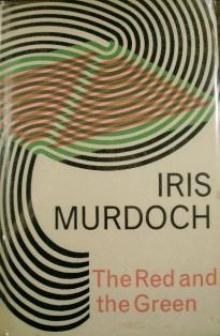 The Red and the Green (Vintage Classics)
The Red and the Green (Vintage Classics)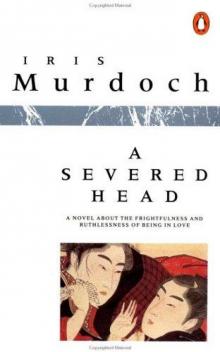 A Severed Head
A Severed Head The Black Prince
The Black Prince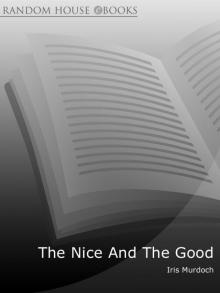 The Nice and the Good
The Nice and the Good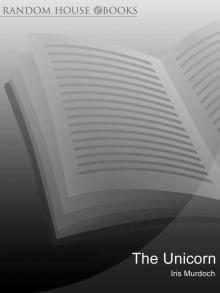 The Unicorn
The Unicorn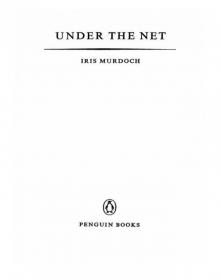 Under the Net
Under the Net The Italian Girl
The Italian Girl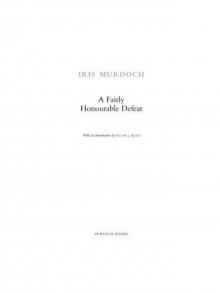 A Fairly Honourable Defeat
A Fairly Honourable Defeat An Accidental Man
An Accidental Man A Word Child
A Word Child The Philosopher's Pupil
The Philosopher's Pupil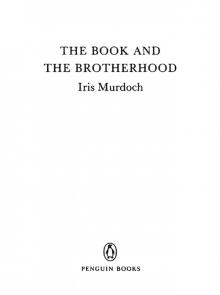 The Book and the Brotherhood
The Book and the Brotherhood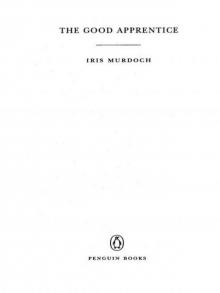 The Good Apprentice
The Good Apprentice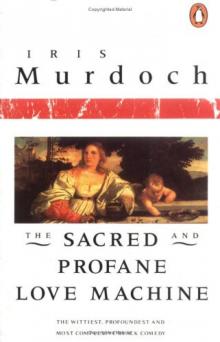 The Sacred and Profane Love Machine
The Sacred and Profane Love Machine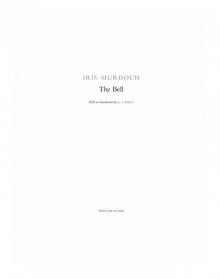 The Bell
The Bell Henry and Cato
Henry and Cato Metaphysics as a Guide to Morals
Metaphysics as a Guide to Morals The Time of the Angels
The Time of the Angels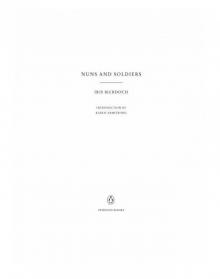 Nuns and Soldiers
Nuns and Soldiers The Green Knight
The Green Knight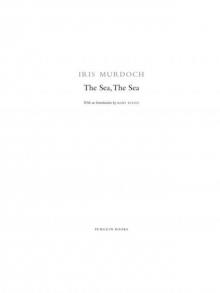 The Sea, the Sea
The Sea, the Sea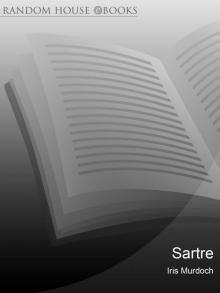 Sartre: Romantic Rationalist
Sartre: Romantic Rationalist Bruno's Dream
Bruno's Dream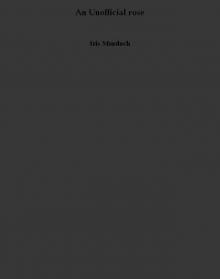 An Unofficial rose
An Unofficial rose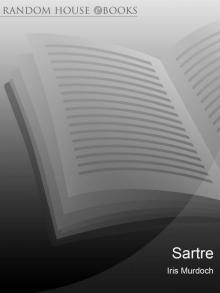 Sartre
Sartre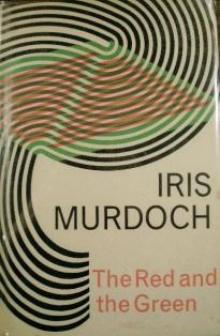 The Red and The Green
The Red and The Green